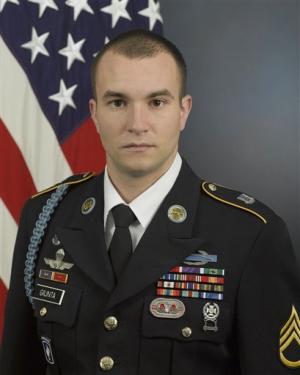
On Oct. 25, 2007, on a remote hilltop in Afghanistan's Korengal Valley, Army Staff Sgt. Salvatore Giunta repeatedly ran directly into fire from Taliban insurgents to save the lives of some of his fellow soldiers. In recognition of Giunta's bravery, President Obama on Tuesdays is presenting him with the country's highest military award, the Medal of Honor, making Giunta the first living soldier since the Vietnam War to receive the award given for acts of extreme bravery in the face of almost certain death.
Born and raised in Iowa to parents of Italian descent, the humble Giunta -- who was shot twice during the incident in the valley that day, though neither bullet pierced the body armor he was wearing -- is a reluctant hero. In an interview with Lara Logan that aired on CBS's "60 Minutes" over the weekend, Giunta expressed uneasiness with all the attention he's getting.
"I'm not at peace with that at all," Giunta said. "And coming and talking about it and people wanting to shake my hand because of it, it hurts me, because it's not what I want. And to be with so many people doing so much stuff and then to be singled out--and put forward. I mean, everyone did something."
When Logan asked him to evaluate himself as a soldier, Giunta said, "I'm average. I'm mediocre," adding, "This is only one moment. I don't think I did anything that anyone else I was with wouldn't have done. I was in a position to do it. That was what needed to be done. So that's what I did."
So who is Sal Giunta?
In a short film by war journalist Sebastian Junger called "The Sal Giunta Story," Giunta said that he was still in school and working as a "sandwich artist" at a Subway in Iowa when he joined the Army. Giunta, the son of a teacher and a medical equipment technician, enlisted in November 2003, spurred mainly by the memory of the 9/11 attacks. After attending basic training and infantry school at Fort Benning, Ga., Giunta was deployed to Afghanistan from March 2005 until March 2006 and again from May 2007 until July 2008.
"When I was first deployed, I was excited, I was ready," Giunta told Junger. "'Let's do this.' I got my gun. I jumped out of the planes. 'We're going to war. This is what I came here to do. Let's do this.'"
But as Giunta recounts his initial tour, his gung-ho enthusiasm to fight was soon tempered by the harsh realities of war. Assigned to the Army's 173rd Airborne Brigade, Giunta and his unit spent 15 months in the Korengal Valley, a hotly contested 6-mile-by-1-mile stretch of terrain near the Afghanistan-Pakistan border that became known to American soldiers as the "Valley of Death."
In a 2008 New York Times story on the fighting in the valley, reporter Elizabeth Rubin starkly depicted the conflict, and particularly the opposition: "The Korengal fighters are fierce, know the terrain and watch the Americans' every move. On their hand-held radios, the old jihadis call the Americans 'monkeys,' infidels,' 'bastards' and 'the kids.' It's psychological warfare; they know the Americans monitor their radio chatter."
According to Sgt. Brett Perry, one of the soldiers interviewed in the "60 Minutes" profile of Giunta, it wasn't uncommon for American soldiers stationed in the valley to hold off going to the bathroom until nighttime. Otherwise, he said, they ran too great a risk of drawing enemy fire by moving around in the daylight. "That 15 months in the Korengal Valley, it was hell on Earth," Perry said.
Logan asked Giunta whether he ever woke up wondering "What the hell am I doing here?" That was his first thought every single morning, he told Logan: "We know what we're doing there, but: What the hell are we doing here?"
In another New York Times story about the valley's events, Giunta said of the local insurgents: "These people won't leave this valley. They have been here far before I could fathom an Afghanistan."
On the day his heroics earned him the Medal of Honor, Giunta and his unit were ambushed on a plateau some 8,000 feet up in the mountains on the last day of a six-day offensive to try to take control of the area. Cold and exhausted, they'd slept in ditches the five previous nights. Here's how the White House describes what happened next:
When an insurgent force ambush split Specialist Giunta's squad into two groups, he exposed himself to enemy fire to pull a comrade back to cover. Later, while engaging the enemy and attempting to link up with the rest of his squad, Specialist Giunta noticed two insurgents carrying away a fellow soldier. He immediately engaged the enemy, killing one and wounding the other, and provided medical aid to his wounded comrade while the rest of his squad caught up and provided security. His courage and leadership while under extreme enemy fire were integral to his platoon's ability defeat an enemy ambush and recover a fellow American paratrooper from enemy hands.
As uncomfortable as he appears to be in the spotlight, the 25-year-old Giunta had better get used to it: Now part of an elite fraternity, for the rest of his life he'll be seated in a prominent spot at presidential inaugurations and be honored countless times at military events. He is currently stationed in Italy with his wife, Jennifer, whom he married recently after dating for several years.












0 comments:
Post a Comment